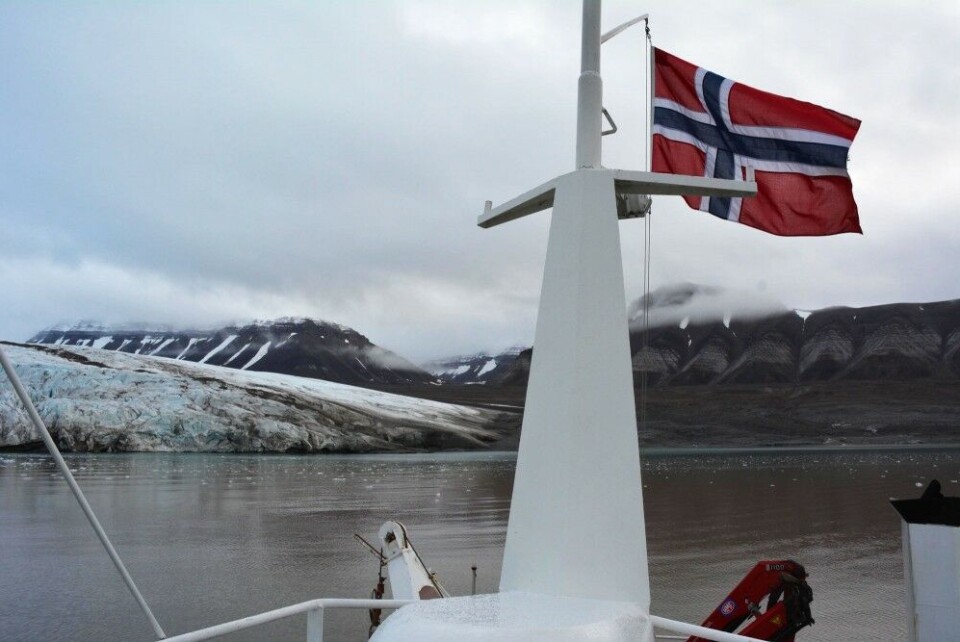
UN report warns Norway - growing oil production is inconsistent with climate efforts
Over the next four years, Norway’s petroleum production will increase by 40 percent. A new report from the UN Environment Programme warns the country and other fossile fuel producers that their expanding industries are not compatible with international climate action.
p.p1 {margin: 0.0px 0.0px 10.5px 0.0px; line-height: 26.0px; font: 17.0px Helvetica; color: #000000; background-color: #ffffff}p.p2 {margin: 0.0px 0.0px 0.0px 0.0px; line-height: 20.0px; font: 17.0px Georgia; color: #1f1f1f; background-color: #ffffff}p.p3 {margin: 0.0px 0.0px 10.5px 0.0px; line-height: 26.0px; font: 17.0px Helvetica; color: #000000; background-color: #ffffff; min-height: 20.0px}p.p4 {margin: 0.0px 0.0px 0.0px 0.0px; line-height: 33.6px; font: 24.0px Georgia; color: #262626; background-color: #ffffff}p.p5 {margin: 0.0px 0.0px 0.0px 0.0px; line-height: 16.0px; font: 14.0px Arial; color: #535353; background-color: #ffffff; min-height: 16.0px}p.p6 {margin: 0.0px 0.0px 0.0px 0.0px; font: 11.0px ‘Helvetica Neue’; color: #000000}p.p7 {margin: 0.0px 0.0px 0.0px 0.0px; line-height: 14.0px; font: 12.0px Times; color: #000000; min-height: 14.0px}p.p8 {margin: 0.0px 0.0px 0.0px 0.0px; line-height: 14.0px; font: 12.0px Times; color: #000000}p.p9 {margin: 0.0px 0.0px 0.0px 0.0px; line-height: 20.0px; font: 17.0px Georgia; color: #1f1f1f; background-color: #ffffff; min-height: 20.0px}span.s1 {font-kerning: none}
Figures from the Norwegian Petroleum Directorate show that a total of 7,45 million Sm³ of oil was extracted from the country’s almost 90 offshore fields in October 2019. That is a growth of almost 17 percent from the previous month.
And more is in the pipeline. According to the Petroleum Directorate, the country’s oil production will by year 2023 increase to 115 million Sm³, a 40 percent increase from 2019.
«The increase in October comes from production at the Johan Sverdrup field and less problems in other fields,» communication adviser at the Directorate Eldbjørg Vaage Melberg explains in a comment to the Barents Observer.
The Johan Sverdrup is Equinor’s new giant North Sea field that holds up to 2,7 billion barrels of oil equivalents. Production was launched on 5th October and is soon expected to reach 600,000 barrels per day.
The increase comes after more than 15 years of falling production. Norway is now moving towards a new peak oil in 2023.
«The Production Gap»
The development is a stark contrast to the recommendations of the UN Environment Program (UNEP) that in a new report raises the alarm that international climate efforts will be futile unless oil, gas and coal production is drastically reduced.
Currently, the trend is moving in the wrong direction, the authors of the report «The Production Gap» argue. The document that was published in November this year warns about a major discrepancy between planned fossil fuel production and efforts aimed at limiting global warming to 1.5°C or 2°C.
According to the researchers, governments are planning to produce about 50 percent more fossil fuels by 2030 than would be consistent with limiting warming to 2°C and 120 percent more than would be consistent with limiting warming to 1.5°C.
The report reviews specific production plans, outlooks, and support mechanisms in the world’s top seven fossil fuel producers, as well as three significant producers with strongly stated climate ambitions. Among the latter is Norway.
Climate failure
The country’s territorial targets are to reduce emissions by 40 percent from 1990 levels by 2030, and by 80–95 percent by 2050. However, the targets might be too ambitious. Emissions from oil and gas production have increased since 1990 and may continue to increase, the researchers say.
In 2017, Norway emitted a total of 52,7 million tons of CO2-equivalents from its territory, a 1,6 percent decline from 2016, but a 3 percent increase from year 1990. The decline continued in 2018, but only with 0,9 percent, figures from Statistics Norway show.
The growing oil production may make it harder for the country to meet its climate targets. According to Equinor, the new Johan Sverdrup project has record-low carbon emissions per barrel. But the export of the oil and its burning will ultimately lead to higher global emissions.
According to the authors of the «The Production Gap», many producer countries «appear to be banking on export markets to justify major increases in production.»
That applies also to Norway, a country that exports exports practically all its oil and natural gas.
Climate court case
There is growing domestic awareness in Norway that future oil and gas policy may be impacted by international climate policy developments. That is reflected also in the ongoing climate law suit against the Norwegian state.
On the 5th November, exactly one month after Equinor launched its Johan Sverdrup field, an appeal case started in the Borgarting Court. Environmental organizations Greenpeace and Friends of the Earth in 2017 sued the Norwegian state for its expansive oil policies, but ultimately lost the case.
According to the environmentalists, the Norwegian oil drilling in Arctic waters violates the national Constitution’s Article 112 that states that the State has an obligation to take measures guaranteeing the citizens’ rights to a secure climate, including for the descendants.
In the center of the court case are ten far northern production licenses issues as part of the country’s 23rd License Round.
«We are taking the licensing of new Arctic oil to court simply because the world has found more fossil fuels than we can ever afford to burn if we are to avoid dangerous climate change,» Truls Gulowsen, head of Greenpeace Norway said to the Barents Observer in 2018.
«If the rights to a healthy environment for future generations shall be upheld, Norway and other fossil fuel nations must respect the carbon budget and stop licensing new oilfields,» he underlined.
… We hope you like to read our articles.
For 17 years, the Barents Observer has provided serious, fact-based stories about life and developments in the North. Please help us to strengthen our independent journalism. Get engaged, give a small donation. Thank you
















